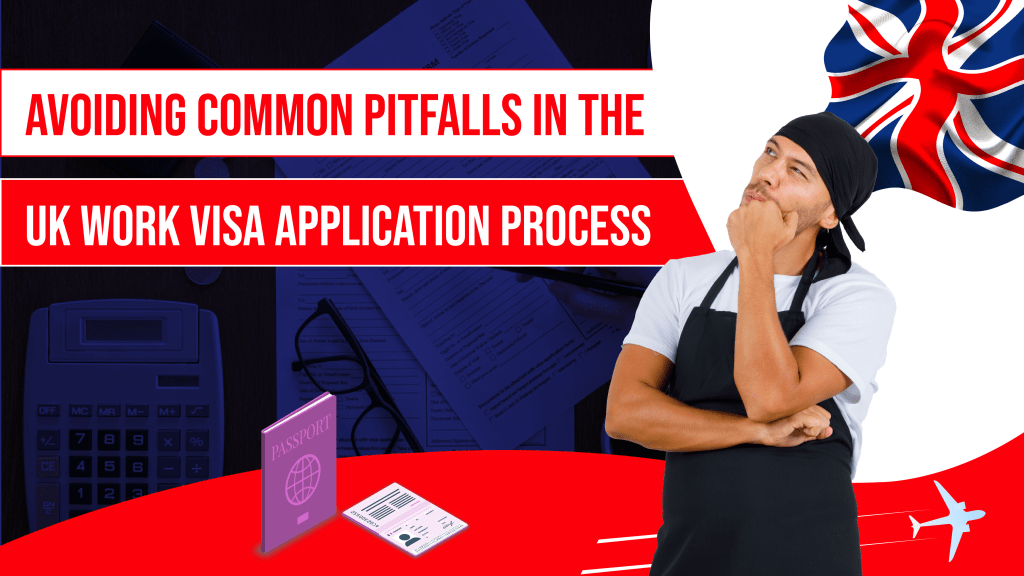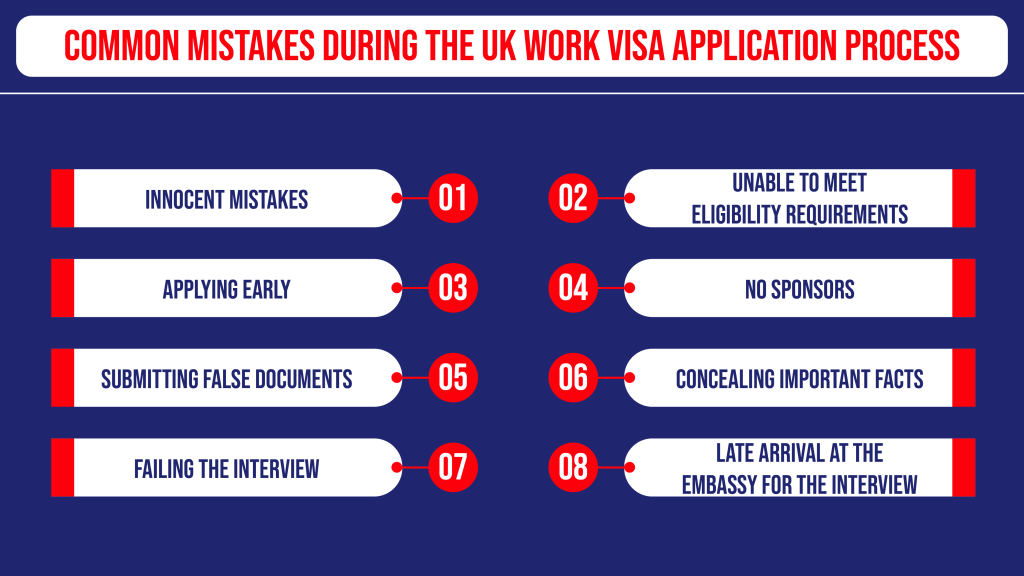
Avoiding Common Pitfalls in the UK Work Visa Application Process
Stringent application processes often lead to several rejections of applicant’s UK visas. The UK government had, at some point turned down a number of bulk proposals due to poor submissions of application papers. Getting a visa approved for someone coming into the UK before everything went online was harder. Nevertheless, such a case does not hold true anymore.
It is possible to apply for a work visa online which presents an ideal opportunity for those seeking employment opportunities in the UK. So, Let’s get a deep understanding of the subject and understand the common errors to avoid when applying for a UK work visa.
Common Mistakes During The UK Work Visa Application Process

It is essential to be meticulous when a visa is applied for in the United Kingdom as well as when one seeks to extend his stay on the basis of further leave-to-remain. Regrettably, mistakes are made all the time and in this case, there are usually these types of them happening:
● Innocent Mistakes
The term “innocent mistakes” generally refers to unintentional missteps resulting from oversights or misunderstandings. According to Home Office guidelines, ECOs errors do not entail rejection of visa applications, but it is important to be careful to avoid even getting noticed.
Such unintentional mistakes may comprise, typographic errors, wrong post code or address, mishandling, discrepancies, on dates, and figures. An example is that a potential employee may inadvertently exaggerate his/her pay by writing an annual pay of £250, 000 instead of ‘£25, 000’ per annum. It is considered an accidental error if the job offer letter and wage slips clearly indicate salary amount received. Incorrect documents or giving the wrong application fee can also be included in this group.
● Unable to Meet Eligibility Requirements
Make sure you meet the eligibility criteria set by the university or institution for your chosen course, covering both academic and financial requirements. If the visa authorities believe you might struggle with the educational standards of leading UK universities, there’s a chance your skilled worker visa uk could be rejected.
Academically, maintain a solid GPA and secure a respectable score in English Language Assessment tests to qualify for studying in the UK. Financially, validate your stability by providing sufficient evidence, such as bank statements, estimated expenses, sponsorship letters, and any other required proof.
● Applying Early:
A crucial aspect of the Skilled Worker visa is the sponsorship element. You must be sponsored by a UK employer, and the certificate of sponsorship verifies this. Applying too early means lacking this essential piece of evidence to bolster your application, likely resulting in invalidation or refusal. It’s important to time your application carefully.
● No Sponsors:
It is important to research prior to formally applying for a visa. One of them is locating a suitable sponsor, mostly an appropriate employer.
For the given job, the employer should remunerate ’fair rate’. Which ranges between about £30,000 annually depending on the case. However, some roles like medical paramedics and preregistration midwives would have different salary criteria. Moreover, you will have to give an immigration visa petition that describes the offered employment in detail. Make sure the position falls within the minimum salary requirements, which is around £26,000.
● Submitting False Documents:
This can occur with or without the applicant’s awareness. For instance, you may present an English language certificate indicating you passed a test conducted at an approved test center. However, if that test center loses accreditation, the Home Office no longer accepts tests from that location.
If discovered, falsified or tampered documents could result in the refusal of your application. Knowingly submitting false documents may lead to a 10-year ban on entering the UK, disrupting your work plans significantly. It’s essential to steer clear of such pitfalls.
● Concealing Important Facts:
When questioned about prior visa applications, honesty and thoroughness are key. It makes little sense to omit this information, even if concerns arise about its impact on your application, as the details usually surface. If you faced a visa refusal under a different name or passport, ensure to include this information. Attempts to mislead the Home Office could result in a 10-year ban from entering the UK.
● Failing the Interview:
Some applicants may be called for an interview to confirm details of the role they’re taking up in the UK. While not everyone undergoes an interview, the process can be daunting. The Home Office aims to verify the legitimacy of your offered role, confirming aspects like salary and experience. Above all, they seek consistency between the information in your application and the details provided during the interview.
● Late Arrival at the Embassy for the Interview:
Candidates should aim to arrive at the Embassy a few minutes ahead of the scheduled time, planning their time accordingly. Excuses for tardiness won’t be entertained by officers during the interview. Arriving late can create a negative impression of irresponsible behavior, potentially leading to the rejection of your work visa. Therefore, it’s crucial to avoid even the slightest mistake in this aspect.
How to Apply for a UK Visa?

Here’s a simplified overview of the UK skilled worker visa application process:
● The process of obtaining your Skilled Worker visa kicks off with securing a job offer from an approved UK visa sponsor. If a company wishes to hire you but isn’t yet a UK visa sponsor, they must apply for a visa sponsor license before proceeding.
● Once you have a job offer, your employer will request a Sponsorship Certificate. This certificate, included with your application, serves as proof of a genuine job offer from a legitimate company. The application will inquire about the role and salary to ensure you meet eligibility requirements.
● Various fees accompany the Skilled Worker visa application, covering the application itself and the Health Surcharge by the immigration. Optionally, you can expedite the decision process by paying an additional fee.
● If you’re applying to bring family members (partner, children, or spouse) to the UK, they require their own UK Dependent Visa. If approved, this visa aligns with the duration of your Skilled Worker visa.
● Upon a successful application, you’ll be granted leave to enter the UK. The decision typically arrives within 3 weeks for overseas applications.
How Do You Avoid Rejections For A UK Working Visa?

● Verify that you have filled in all relevant details and ensured that everything is correct.
● Demonstrate that you have enough money for the trip and sustenance within the UK period for initial period of stay with a place to stay. Such records can be like bank statements, employment letters and income tax filings.
● Provide solid links with your origin nation, explain your strategy for leaving after the stated time.
● Seek the assistance of a visa advisor or an immigration attorney, so that your application answers every required issue in full detail.
● Avoid overstaying your visa, engaging in unauthorized employment or violating any rules of immigration.
● Ensure honesty, sincerity, and openness in the application process and throughout your interview. Untrue or misleading statements may result into visa denial and a lifetime ban on entering UK.
Conclusion
It is critical for prospective applicants to be vigilant during the application process for the UK work visa for Indian, as it is riddled with pitfalls. On the other hand, applicants should be keen on innocence errors and eligibility criteria oversight.
Thoroughness counts whether it’s producing true record keeping or locating the appropriate underwriter. This can include falsification of documents and hiding things which could amount to ten ten-year ban. However, for one to succeed in this venture, one should be completely honest, fully prepared, and abide by the laws of immigration leading to a trouble-free trip to employment in the UK.